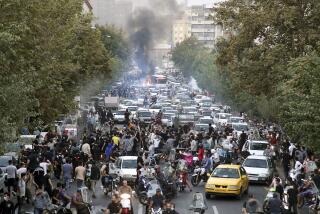Bahai Persecution as Global as Faith’s Reach
- Share via
They’ve been branded as infidels and executed. Even their graves have been desecrated.
Among all world religions, the Bahai faith is one of the most geographically widespread and most persecuted.
Bahai communities are found in more than 200 countries and island territories. The 5.5 million Bahais believe in the equality and unity of the human family’s 5.5 billion people and their religions.
The largest Bahai community, about 1.2 million, is in predominantly Hindu India. The second-largest group, 300,000 to 350,000, forms the biggest non-Islamic religious minority in Shiite Muslim Iran.
Nowhere are the Bahai more oppressed than in this Persian land, where their religion was born in the mid-19th Century. Followers of the prophet-founder Baha’ Allah, Arabic for the “Glory of God,” were persecuted from the beginning. Baha’ Allah, born in Tehran, is revered as the latest of a series of divine messengers that includes Jesus, Mohammed, Zoroaster and Buddha.
The Bahai are targets of religious persecution to this day, in the judgment of the U.N. human rights commission and the U.S. State Department.
“Their leaders have been killed or forced to leave the country,” says Andrew Whitley, director of the New York-based Middle East Watch.
Bahais are barred from jobs in government and state-owned industries, Iran’s largest employers. It is illegal for infidels to receive money from an Islamic government. Pensions are confiscated and revoked. Higher education is forbidden. Travel and passports are restricted.
“If these conditions continue for a century, it would turn the people into paupers. The Bahais would become the Iranian untouchables,” says Firuz Kazemzadeh, professor emeritus of Russian history at Yale University. Kazemzadeh was born into a Bahai family and has been an elected member of the Bahai’s U.S. governing body for 31 years.
“The Bahai faith is under pressure in much of the Muslim world,” Kazemzadeh says. “The religion was completely destroyed in Iraq over the last 25 to 30 years.”
In Iran, organized Bahai activities are prohibited. No Bahai structure is left. Since 1979, when the Islamic fundamentalist regime seized power, 216 Bahais have been killed in Iran. Most of them were religious leaders.
“These weren’t random killings,” Kazemzadeh says. “It was a deliberate attempt to behead the community, like shooting all the Roman Catholic bishops of a country. The persecution is the worst since the mid-19th Century, when 20,000 Bahais died for their faith. This steady, determined campaign to destroy the Bahai community I have called genocide by attrition.”
Because of pressure and publicity from the United Nations and international human rights organizations, large-scale executions and street killings have stopped, Whitley says. The last confirmed execution was in 1992.
“They have been persecuted in every conceivable way,” says Robert Henderson, secretary general of the National Spiritual Assembly of the Bahai of the United States, whose only North American temple is in Wilmette, Ill.
Worldwide, religious persecution is most severe in Iran and other Islamic fundamentalist nations, says the State Department’s 1993 human rights report on 193 countries. In Iran, the penalty for converting to Christianity is death. Christians also suffer major obstacles to freedom of worship in Iraq, Sudan and Somalia.
The seven Bahai houses of worship span the globe. They are in such diverse places as Panama, Germany, Uganda, Australia and Western Samoa. The Bahai international center sits in Haifa, Israel, which was part of Palestine when the exiled prophet Baha’ Allah spent the last 24 years of his life there, dying in 1892.
“Although our numbers are still small, our spread throughout the world is intentional. The principles of our religion are universalist,” Kazemzadeh says.
The Bahai have no organized hierarchy of clergy, no sects or divisions. Everyone follows the written, unchanged teachings of the divine messenger.
The most vital challenge facing the 120,000 U.S. Bahais, Henderson says, is eliminating racism in this country. Bahais set up communities without cultural barriers. They work hard at achieving integration that is more than just acceptance. Twenty years ago there was a deliberate campaign to reach rural black communities in the South.
Today the largest U.S. Bahai communities are in California and South Carolina.
Whether at the United Nations or on a Pacific island, says Kit Bigelow Cosby, deputy director of the Bahai external affairs office in Washington, D.C., “every Bahai is dedicated to establishing peace on the planet.”
More to Read
Sign up for Essential California
The most important California stories and recommendations in your inbox every morning.
You may occasionally receive promotional content from the Los Angeles Times.












